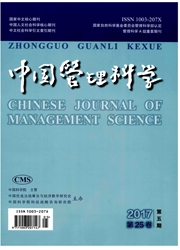

 中文摘要:
中文摘要:
针对PPP基础设施项目建设中激励机制涉及的企业最优努力水平、政府监督及关系契约的预期收益三大因素加以分析;从动态的角度出发,在Holmstrom和Tirole激励模型的基础上,运用委托代理理论设计公私部门两阶段合作的激励合同,通过对不同阶段企业最优努力水平和政府监督奖惩因子的分析,得到影响企业最优努力水平和政府监督奖惩因子的相关因素以及企业两阶段决策中的动态影响;最后分别通过对政府外部监督与企业内在激励的分析,提出PPP项目建设中权变激励的激励机制和方向,从而为PPP项目建设中有效激励合同的设计提供一定的指导。
 英文摘要:
英文摘要:
Considering the three major factors in the construction of PPP infrastructure projects,i.e.the optimal effort level of private sector,the supervision of public sector and the expected profit of relational contract,from the dynamic point of view,we apply the principal-agent theory to design a two-stage cooperation incentive contract between public and private sectors based on Holmstrom and Tirole incentive model.By analyzing the optimal effort level and supervision of the incentive factor in each stage,we conclude the effect of the relevant factors and the dynamic interaction of two stages.We advance the contingent incentive mechanism by comparing the external supervision and intrinsic incentive,so as to provide some guidance to the design of effective incentive contract between public and private sectors in PPP projects.
 同期刊论文项目
同期刊论文项目
 同项目期刊论文
同项目期刊论文
 期刊信息
期刊信息
